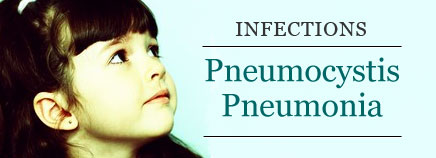
Pneumocystis pneumonia (PCP) is an infection caused by Pneumocystis jiroveci, a microscopic fungus that lives in the lungs of many people.
About PCP
PCP is a rare disease in healthy people. However, it can be serious in those who have AIDS, cancer, or other conditions that weaken the immune system.
PCP is one of the most common pediatric illnesses associated with AIDS, especially in babies younger than 6 months old. Its prevention is very important in AIDS care since it is a leading cause of death in people with AIDS.
In kids who are already seriously ill, symptoms of this form of PCP begin suddenly with a fever, a cough, and difficulty breathing. A child may not cough up any mucus because it is usually too thick to come up with the cough. Other symptoms can include weight loss and night sweats.
Babies who are already sick or have a weakened immune system also can develop PCP. In most cases, the baby is 3 to 6 months old and has no fever, but gradually begins to breathe faster than normal. As the lung infection gets worse, breathing becomes more difficult, and the baby’s chest muscles may begin to retract (pull in abnormally) with each breath. The child’s lips, fingernails, and skin also may turn blue or gray.
Diagnosing PCP
Doctors sometimes can diagnose pneumocystis pneumonia through an X-ray. Or they may suspect it in patients with a fever, cough, and difficulty breathing who also have very low oxygen levels in their bloodstream. This is confirmed by finding the fungus in lung fluid samples sent to a laboratory for testing.
Even if your child has no other medical problems, call your doctor immediately if your child has unusually fast breathing or difficulty breathing, is coughing, or has a blue or gray color to the nails, lips, or skin.
Treating PCP
Early treatment is key because PCP is a potentially life-threatening infection. Antibiotics, either alone or in special combinations, are usually used to treat it. These may be given by mouth or intravenously (into a vein) for at least 2 weeks. If a child has AIDS, antibiotic treatment will probably last about 3 weeks. Depending on the severity of the PCP infection, the doctor may add a steroid medicine.
If your child has any condition that severely weakens the immune system, talk to your doctor about whether your child should take antibiotics to prevent pneumocystis infection.
Infants born to HIV-infected mothers should begin treatment to prevent PCP at 1 month of age until it’s known for sure whether they have the HIV infection.
Because of the seriousness of this infection, most kids who have symptoms of pneumocystis infection are treated in the hospital. Some of the different antibiotics that may be used to treat it can have side effects, which are easier to watch for and manage in a hospital.

